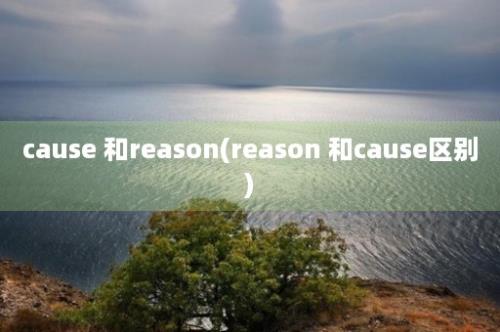cause和easo(easo和cause区别)
在生活中,很多人可能想了解和弄清楚易混淆词汇区别:cause与reason的相关问题?那么关于cause 和reason的答案我来给大家详细解答下。

Cause和reason都可表示“原因”或“理由”的意思。但各词所表示的原因不同。
1.cause是常用词,指导致某种结果的直接原因,表示因果关系。同时还可指理由。一般作“原因”讲时为可数每名词,后常跟of。作“理由”讲时为不可数每次,后常跟介词of或for,一般用来表示不愉快的事件。
例句1:Heat is the cause of the expansion of matter. 热是物体膨胀的原因。
例句2:Carelessness is often the cause of fires.疏忽往往是失火的原因。
2.reason 是说明一种看法或行为的“理由”,用来指解释某些已发生的事情的理由,或作为解释的借口。着重指在逻辑上导致结果的原因。借此说明产生某事的根由。多用作可数名词。也可接不定式或从句。
例句1:He should be asked to give us his reason for publishing that book.我们应当要求他向我们说明他出版那本书的理由。
例句2:The reason why he’s late is that there was a traffic jam.他迟到的原因是途中遇到交通堵塞。
补充学习:reason 还可用作动词,表示推理、推论。是指用理智、正确的思维方式来引出结论。
例句1:He reasoned that if we started at dawn,we would be there by noon.他推断,我们要是黎明出发,中午就能到。
总结: cause和reason 都可以表示“原因”cause侧重事情的直接原因,reason侧重结果的逻辑原因,cause多与介词of搭配,reason多与介词for搭配。
温馨提示:通过以上关于易混淆词汇区别:cause与reason内容介绍后,相信大家有新的了解,更希望可以对你有所帮助。